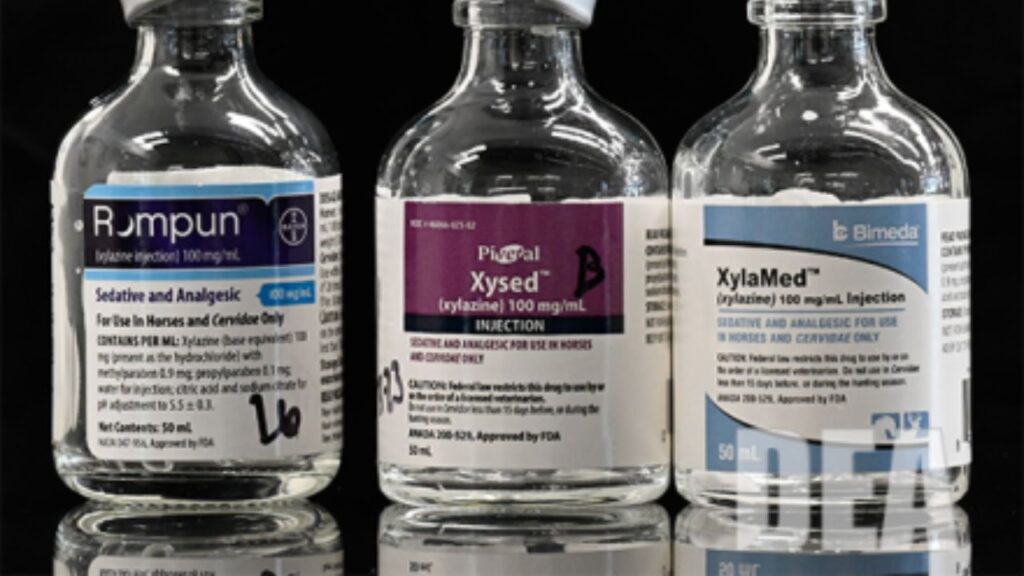The illicit drug supply in the United States faces a new and deadly threat. Xylazine, a powerful veterinary sedative never approved for human use, has infiltrated the street drug supply at an alarming rate, particularly in combination with fentanyl and other opioids. This emerging trend poses unprecedented challenges for healthcare providers, first responders, and addiction treatment specialists across the Southeast and beyond.
Originally developed in the 1960s as an animal tranquilizer, xylazine remains a crucial tool in veterinary medicine for sedating large animals such as horses and cattle. The drug, often called “tranq” or “zombie drug” on the street, has now found its way into the illicit drug supply, creating devastating consequences for human users who may not even know of its presence in their drugs.
A Growing Crisis
The Drug Enforcement Administration reports a sharp increase in xylazine-positive drug samples across the country. In the Southeast, including Tennessee, the drug’s presence has grown exponentially since 2019. Medical examiners increasingly find xylazine in toxicology reports of overdose victims, often alongside fentanyl and other opioids.
Understanding Xylazine’s Effects
When humans consume xylazine, it acts as a central nervous system depressant, causing severe drowsiness, respiratory depression, and dangerously low blood pressure. Unlike opioids, xylazine does not target opioid receptors in the brain, which leads to one of its most alarming characteristics: naloxone, the life-saving medication that reverses opioid overdoses, does not counteract xylazine’s effects.
Unique Health Risks
Perhaps the most visible trademark of xylazine exposure is the development of severe skin ulcers. These wounds can appear anywhere on the body, not just at injection sites, and often prove resistant to standard medical treatment. The ulcers can become severe enough to require surgical intervention and may lead to amputation in extreme cases.
Additional risks include:
- Severe respiratory depression
- Dangerous drops in heart rate and blood pressure
- Extended periods of unconsciousness
- Increased risk of bacterial infections
- Higher likelihood of overdose when combined with opioids
Recognizing Xylazine Exposure
Healthcare providers and users should watch for several key indicators that may suggest xylazine’s presence:
- Excessive sedation that persists even after naloxone administration
- Unexpected skin wounds or ulcers
- Severe respiratory depression
- Low blood pressure resistant to standard treatments
- Extended recovery time from overdose
The Southeast’s Unique Challenges
The Southeast region faces particular challenges with xylazine due to several factors. Rural areas may have limited access to emergency medical services, creating dangerous delays in overdose response times. Additionally, the region’s established patterns of opioid distribution make it vulnerable to emerging drug threats like xylazine.
Treatment Approaches and Hope for Recovery
Despite these challenges, effective treatment options exist for individuals exposed to xylazine-contaminated drugs. JourneyPure At The River has developed specialized protocols to address this emerging threat, incorporating both immediate medical intervention and long-term recovery support.
Our comprehensive approach includes:
- Medical detoxification services specifically designed for polysubstance use
- Advanced wound care and medical monitoring
- Evidence-based behavioral therapies
- Long-term recovery planning
- Family support and education
- Continuing care services
Taking Action
The presence of xylazine in the drug supply represents a significant escalation in the ongoing overdose crisis. However, help is available. If you or someone you know may have been exposed to xylazine-contaminated drugs, immediate medical attention is crucial.
JourneyPure At The River stands ready to help with our specialized medical detox services and comprehensive treatment approach. Our experienced medical team understands the unique challenges posed by xylazine exposure and has developed effective protocols to support recovery.
Don’t wait until it’s too late. Call JourneyPure At The River today at 629-222-9449 to speak with our admissions team about our specialized treatment programs. Your journey to recovery can start right now.

